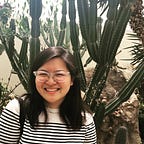Introducing Coding it Forward’s inaugural Build cohort
Four student teams working on projects that make a difference
In January, we opened applications for the first iteration of Coding it Forward’s Build Program. Within a week, we were thrilled to see nearly 50 teams from around the country apply to join our first cohort. Since then, our teams have been working towards creating impactful products and services by conducting user research and learning about product strategy.
Over the course of the spring semester, the teams will continue to develop their projects. We’re honored to be part of their journey and to share their stories with you.
Meet our Build teams!
Dollar Vote
Dollar Vote gives users instant access to all the hidden or difficult to find data that they need in order to make smarter, more ethical purchasing decisions that support the political causes they believe in. It does so in the form of a browser extension that marks products you view online with a metric describing how much in line a brand is with the user’s personal political values.
Q. What inspired your project?
A. Being a part of Berkeley’s highly politically aware and engaged campus, our team saw people all around us looking for ways to take action and support causes and issues that they believe in. We noticed, however, that a lot of these students just didn’t know how to tangibly do so on a regular basis. After all, you only vote twice a year at most. Protesting, a significant way in which a person can empower political voices, is difficult and time-consuming as well as inaccessible or dangerous depending on where you live. Boycotting products requires people to change the way they shop entirely and research products every time they want to make a purchase. We wanted to give people an outlet for action that was more frictionless and integrated into their daily lives, and that’s where Dollar Vote stems from.
Chicago Gentrification Data Project
I am inspired by the Citizens Police Data Project, which publishes information about police misconduct on an interactive platform. The central component of the Chicago Gentrification Data Project will be a flexible data visualization of the city that highlights the phenomenon of vulnerable residents being pushed out of the city over time by rising prices. This data visualization would most importantly incorporate a timeline of housing policies within the past 10 years to inform users of the most significant contributors to gentrification.
Q. Why are you excited to join Build?
A. The recent cases of some tech companies’ ethics not aligning with those of their employees challenged me to reflect on the kinds of projects that I want to see in existence. I had never seriously considered social good projects until I thought about what would be, in my view, a ‘social bad’ project. I decided then that I want to build projects with intentionality in order to create lasting, positive social impacts.
I’ve often felt alienated in hackathons — in my experience, social good projects tend to not catch as much lip service as other categories — so Build’s inclusive learning environment caught my attention right away. It seemed like the perfect place to launch and develop my idea to educate Chicago residents about gentrification. Moreover, I love that I get to interface with folks who are also dedicated to developing projects that have a personal story to them.
Stanford Open Data Project
At the Stanford Daily, Stanford’s student newspaper, journalists are constantly trying to write interesting stories about the university in order to raise awareness of issues and subsequently spark change. Many stories gain credibility and accuracy from being data-informed. In addition, there are many stories that would not even be discovered without seeing the data first. That’s why it’s incredibly important to have cost-free and convenient access to Stanford data that is easy to use and visualize. The Stanford Open Data Project aims to fill exactly this need by creating a user-friendly Open Data Portal with data on university finances, student life, academics, and more.
Q. What is your favorite thing about technology, and why?
A. We love that anyone with access to a computer can change the world through technology. Before modern technology, aspiring journalists, makers, and thinkers faced significant barriers to information and platforms to spread their ideas. Now, we genuinely believe that creativity and passion are far more important than age and status, and this inspires us to dream big. This democratizing effect of technology needs to be taken advantage of, which is an additional inspiration for us to use tech to further democratize reporting through an open data portal.
LiveWell
By pulling well data from The Humanitarian Data Exchange, LiveWell is able to create a map of existing water wells in Djibouti. The team then built an Android application that allowed users to report new water wells, make updates to the quality of current ones, and report any water well maintenance needs—all in real-time. LiveWell was also one of the winning teams at TreeHacks, taking home Coding it Forward’s best Safety hack.
Q. What is your favorite thing about technology, and why?
A. Connectedness. Being able to FaceTime someone 3000 miles away is the best.
Learn more about Build and other Coding it Forward programs by joining our Facebook group, subscribing to our newsletter, and following us on Twitter.
